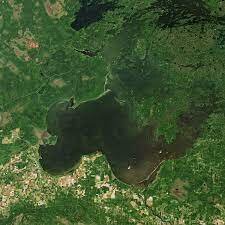Harmful algal blooms work by disrupting food webs, Dr Caron said. Creatures such as shellfish, anchovies and sardines consume the toxins before then being eaten by larger marine mammals. "They eat a meal of those highly toxic fish and then they become toxified themselves, and if they get enough of that material, it of course can kill them, which is happening now," he said.
Blue-green algae takes over many Alberta lakes as hot weather returns this week: ‘It smells like sewage’
With another hot week in store for much of Alberta, many people are getting out to try to soak up and enjoy the remaining days of summer. With that, many will flock to nearby lakes to spend time at the beach. But several of Alberta’s lakes have been taken over by blue-green algae this summer, including Garner Lake where Harold Kinasewich calls home. Kinasewich has had a family property on Sunrise Beach since the 1950s. Now semi-retired, he lives at the lake and it’s a place where he spends a lot of quality time with his kids and grandkids.
'Sleepwalking to disaster': Biology prof on how climate change is wreaking havoc on our lakes
When you head down to a lake in Canada this summer, you might spot more algae covering the surface than usual. This is just one of the scary impacts that our warming planet is having on lakes globally right now, according to a biology professor. It’s part of a pattern that is only going to increase with global warming, John Smol, a professor at Queen’s University, told CTV News Channel, painting a picture of lakes shrinking, others flooding, fish species dying out and algal blooms killing off underwater plants.
It's not just the smoke — as climate change prompts more wildfires, hidden health risks emerge
And though the risks from smoke are among the biggest worries, there are also less-obvious health concerns such as the impact on mental health and clean water to consider. The particles that waft into the air affect more than just physical health. Those particles also land on trees, plants, buildings and end up in water. Ash, sediment and minerals not only flow into streams and rivers, but also downstream into lakes and reservoirs, potentially affecting drinking water and contributing to algal blooms. The good news is that in Canada the water purification systems are able to filter them out for the most part. But the added strain on the system means that it may cost more to handle the higher level of contaminants.
Have Your Say: Environment and Climate Change Canada Public Sessions - Managing Algae Blooms on Lake of the Woods
Environment and Climate Change Canada (ECCC) has completed four years of water quality research on Lake of the Woods and now wants to hear from you regarding their proposed ecosystem objectives and phosphorus reduction options to help manage algal blooms. To take part in this virtual webinar, please register at www.lowwsf.com/eccc-consultation
'A new normal': decreasing ice cover on the Great Lakes
The changes caused by declining ice cover on the Great Lakes are pretty bad, but it's not all doom and gloom. Ice cover on the Great Lakes has declined in the past 40 years with average ice coverage dropping up to 75 per cent, depending on the lake. "We rely a lot on the Great Lakes for shipping ... so an ice-free Great Lake is not a barrier to shipping. But beyond that there are a lot of negatives associated," said Mike McKay, the executive director for the Great Lakes Institute for Environmental Research (GLIER), based at the University of Windsor.
Time to act on algae is now, says organization calling for Lake of the Woods phosphorus reduction
A watershed board focused on protecting Lake of the Woods is calling on Manitoba's provincial government to reduce the amount of phosphorus running into the basin. The organization wants the governments of Manitoba, Ontario and Canada to commit to an 18.4 per cent reduction in phosphorus loads to improve the health of the water body.








